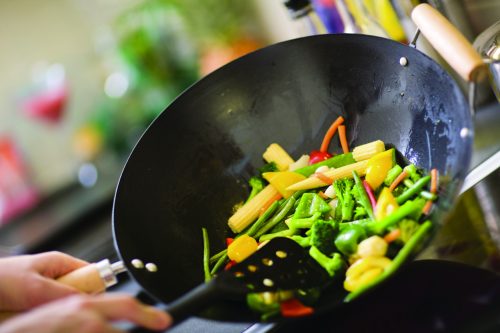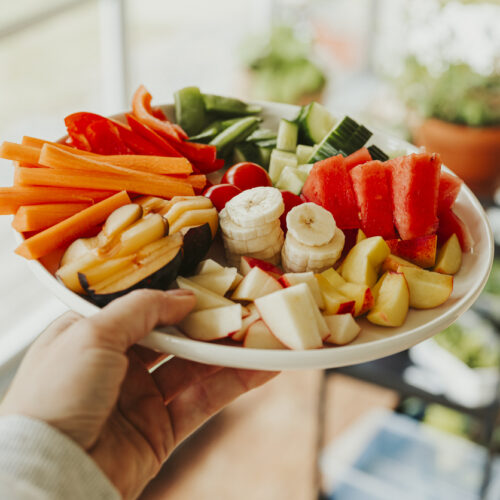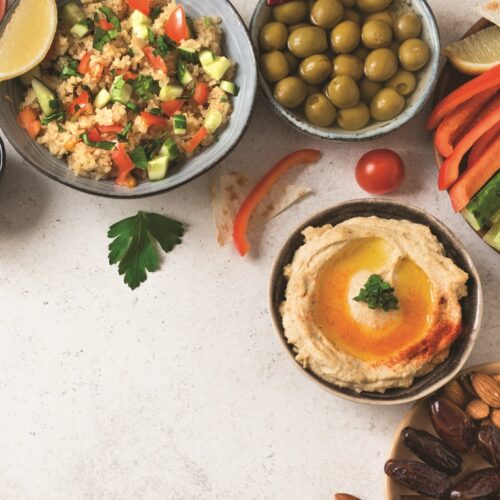
Nutritionist Bronwen King helps banish any kitchen stress forever with her plan for getting organised and shopping smarter.
Never before in history has food preparation seemed ‘easier’. We have a huge range of food at our fingertips in supermarkets, ‘convenience’ foods galore, appliances that make every task quicker, and recipes to last a lifetime. But still, many of us find getting dinner on the table a stressful chore.
Why? Our modern world overwhelms us with choice
It’s difficult to make decisions – we become paralysed. Some would also say food has become a little like fashion: we feel pressure to perform in unrealistic ways. Some of our most memorable meals may have been had camping or tramping; meals which were stress free, simple to prepare and delicious, because the options and expectations were limited.
So how do we banish kitchen stress?
The trick is to develop routines to improve efficiency and work within our comfort zones. These steps will get you started on the path to stress-free meals every night of the week.
Organise your kitchen
Having a tidy and organised kitchen may sound like an impossible dream, but spending some time sorting and chucking things out will save you time every day once it’s done.
- Patrol your pantry and fridge. Get rid of old food you haven’t used. Take note of ingredients you forgot you had, and work them into upcoming meals.
- Sort out your drawers and cupboards. This doesn’t have to be done all at once; it could be factored into the weekly clean, one cupboard or drawer at a time.
- Keep only the things you need and regularly use. Set up a ‘garage sale’ container in your garage and use it for any equipment, plates, cutlery and implements you haven’t used in the last year. If you can’t bear to part with things, at least find a storage place out of the kitchen.
- Update your equipment. A food processor, stick blender or good set of knives can make a huge difference to the ease and enjoyment of cooking.
- Clean and clear. Clean benches and clear spaces are an easier, more inspiring work environment. Move decorative items to shelves or other rooms and train the family not to dump keys, wallets, change, and bags on the kitchen bench.
Plot and plan
While it may seem hard ‘finding the time to plan’, taking the time will actually save you time and angst. It can also save you money.
- Make a weekly meal plan. This can take as little time as 10 minutes a week. Factor in ingredients which need using up.
- Plan at least one meal which can form the basis of another meal the following night. Leftovers from roast chicken, for example, can morph into chicken risotto or chicken burritos.
- Factor into your plan appliances you have such as crockpots and bread makers. These can simplify dishes and save time and money.
- Make a list of favourite meals and keep this handy. Favourite recipes can often get forgotten among the pile of recipe books and magazines. When you have a successful meal, write it down. Put this on the fridge as a reminder so you are never short on ideas.
- Repeat meals you are familiar with to save stress. There is nothing more comforting than an old favourite!
- Make a master shopping list. Include core items such as flour, cereals, bread, tea, coffee, milk, herbs and spices. Include other commonly used pantry ingredients such as canned tomatoes, sauces, canned fruit, jams and chutneys. List favourite fresh fruit and vegetables, dairy items and commonly-used meat, fish or poultry cuts. Leave spare lines for other items. Print or photocopy multiple copies to keep one on the fridge or somewhere handy each week. Each time you run out of an item, or you’ve just about run out, mark your list accordingly.
- Create your list in the same order as your supermarket. If you first have to pass through the fruit and vegetable section, set up your template so that fruit and vegetables are at the top.
Shop smart
- Aim for one weekly shop. Each shopping trip costs you time and money. Less shopping means more time to cook or do other things. Avoid peak times to avoid queues and trolley rage!
- Stick to your list. Set yourself a challenge to see how quickly you get in and out of the supermarket.
- Do not shop when hungry. This may colour your choices and send foods you don’t need leaping into your shopping trolley.
- Consider bulk buying. If items from your master list are on special, buying them in bulk to stock the pantry could be a money-saver.
Cook smart
- Keep it comfortable. Maintain confidence by sticking to familiar foods and preparation techniques. If Nana’s and Mum’s recipes are your favourites, hold your head high while you continue tradition. Extend yourself when you feel like it, not because of fashion, social pressure or the need to impress.
- Use our ‘meal in minutes’ chart. Keep ingredients for some of the meals on hand for those nights when time is limited, you are tired or need a break.
- Manage your time. Defrost in advance any frozen items you might need; put aside five minutes in the morning to fill the slow cooker and learn to use it; and take advantage of the pre-set function on your oven and bread maker.
- Choose one night a week or take time in the weekend to cook in bulk. It takes little extra time to double-up on a recipe, yet it could mean a relaxing night off the following week. Cook several boneless chicken breasts at once then use them for meals in the next two days; chop and add to cooked pasta, slice over a salad or top a pizza. Or add with a can of corn to chicken stock for a yummy chicken and corn soup.
- Cook basic recipes in bulk and freeze. Recipes such as basic mince can be quickly turned into a range of delicious dishes in little time.
- Make friends with your crockpot. Wipe off the gathering dust and put it to good use. Soups, casseroles, corned beef – the meals you can make in a crockpot are almost limitless. A few minutes of work is all it takes to make a meal that usually provides enough leftovers for another meal.
- Don’t be afraid to deviate slightly from a recipe. If a recipe specifies canola oil but you only have sunflower oil, sunflower oil will do. There are lots of similar substitutions that will not distract from the success of the end product: raisins for sultanas, figs for prunes, plain Greek yoghurt for sour cream, oregano for mixed herbs. A can of tomatoes puréed with a little added tomato sauce works well if you don’t have pasta sauce. Most confident cooks will substitute and be creative: you’re unlikely to wreck a recipe by doing this.
- Be careful with baking. A word of caution: cakes, muffins and other baked goods have precise rations of flour, liquid, eggs, sugar and fat. Unless you’re experienced, it is unwise to alter proportions. You can, however, substitute brown sugar for white, reduced-fat spread for butter and replace full cream with trim milk.
- Make one night a week ‘MasterChef night’. Give yourself a night off by holding a cooking competition. Engage children who are old enough, flatmates, partners, or other household members to take turns wowing the household with new recipes. Add winning recipes to your favourite meal list.
Recipe ideas
Check out our 100 meals from 10 essential recipes collection – these basics can be easily transformed in minutes to become delicious family favourites.
Basic roasted vegetables – 10 meals!
Basic tomato pasta sauce – 10 meals!
Basic minced meat – 10 meals!
Basic soup – 10 meals!
Basic scones – 10 variations!
Basic savoury mince – 10 meals!
Basic casserole – 10 meals!
Basic stir-fry – 10 meals!
www.healthyfood.com










